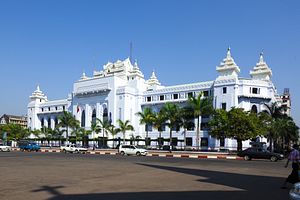Myanmar is facing a stark choice – open the doors to the rule of law or slide into Chinese-style state capitalism run by the military.
So far it looks like the country could go either way. The military is guaranteed 25 percent of the seats in parliament, giving it a strong position to dominate the country’s political system. The military also has a growing presence in the economy mainly through local land grabs and a cozy relationship with global corporations. Former head of state Than Shwe was replaced in 2011 by the first civilian president in nearly 50 years, Thein Sein. Though the nominal civilian government is still backed by the military, Than Shwe has seen the power of his supporters diminished.
“We are a hybrid democracy with many factions. We have all the ingredients for an unsuccessful transition,” says a Myanmar official with an international peace group based in Yangon.
Amidst the shifting political sands, there is a surprising secret weapon in Myanmar’s arsenal: a cultural affinity for grassroots democracy. After spending a week in Myanmar in December with the Mansfield Foundation preparing for a rule of law conference at Hong Kong University next year, I was astonished at the gut level instinct for freedom of expression and assembly. It’s all over the country.
For example, there is a group actively training local lawyers in 14 districts across the country how to fight illegal activities to press the local governments to return illegally acquired land. “Many of these cases have been won,” a representative said.
There’s also the Myanmar Business Executives, with a membership that includes many female business leaders. It trains small businesses and has even set up a micro finance operation. Making capital available to small businesses that operate outside the formal banking system expands economic rights and is a sign of declining state control.
The government began relaxing limits on media censorship in 2011 but last year officially unblocked most banned content, including the websites of foreign media outlets that criticized the government. As a result, the English press – and to a lesser degree the Burmese press – routinely runs stories about ethnic rights and political opposition. Reporters are still thrown in jail, along with protestors under Myanmar’s Article 18 against freedom of assembly, but they tend to be treated better than in the past – although the jury is still out on their future.
Earlier this year, a nationwide protest backed diverse groups was able to force the government to cancel a dam project funded by China Power International. Although the lead campaigner was later thrown in jail, the dam “united many different groups because the river runs through the country,” observes one human rights worker.
An independent environmental group called Ecodev is teaching villagers in 42 of 330 townships – soon to expand to 72 – how to push the local authorities to follow environmental laws already on the books. Yangon has already declared 189 buildings as heritage sites.
It’s not just the actual work, though. It’s the sense that, unlike some countries where the state presence is felt everywhere, human rights workers aren’t always looking over their shoulders when they discuss plans for political activism.
There are two major flaws in the picture that explains why many rights activists say they are only “cautiously” optimistic: the continued strength of the military, and strife surrounding ethnic groups. There’s a lot of nervousness about how much power the military intends to control after the elections in 2015 – and how much they control now. Apart from the guaranteed 25 percent of parliamentary seats, the military is widely accused of taking advantage of a booming economy to grab land. I was standing outside an outdoor restaurant in Yangon waiting for a taxi and across the street spotted two new eight-story residential buildings – whose windows were completely dark. “One is owned by a drug dealer who was arrested and the other by the military,” the restaurant’s doorman said.
The military has been a big supporter of the Chinese-backed pipeline that will run from the Bay of Bengal into China’s Yunnan Province – despite widespread concerns about pollution, corruption, and land acquisition. “We are looking at the gas pipeline but I don’t want to cause a diplomatic incident,” says one environmental rights worker.
The second issue is the knotty problem of ethnic rights. There are 134 ethnic groups assigned to eight official races, although scholars such as Yale University’s James Scott argues that most of them are not ethnically separate but have chosen to leave or have been forced out of the Burmese State. They are losing access to land that is increasingly valuable as Myanmar’s GDP growth tops 6.5 percent.
The biggest loser in this battle thus far has been the Rohingya, a Muslim group that the government does not believe are citizens. Even many citizens accuse the Rohingya of being expatriated Bangladeshis and not really part of Myanmar.
There is a forceful opposition in the form of Aung Sang Suu Kyi, the charismatic former éminence grise who is now actively pursuing office. Yet after twenty years of isolation, and with no active political experience, Suu Kyi needs to organize a strong team and build a political party capable of governing.
Despite these myriad problems one can’t help but feel a forceful current of passionate opposition bubbling to the surface, arguably a legacy of British rule. This year, Yangon University launched a human rights program. A Christian group comprising ethnic minorities even held a large religious meeting in Yangon earlier in December with the tacit approval of the government. “We are watching and waiting,” says a Christian representative of the Lisu minority who is helping to organize the meeting.
Andrew Collier is a Senior Fellow with the Mansfield Foundation.
































